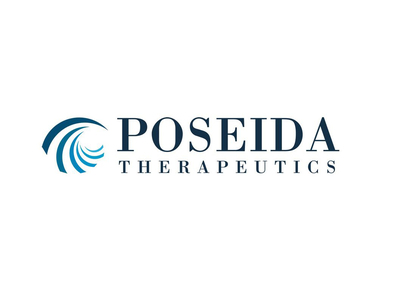Poseida Therapeutics Presents New Case Study Demonstrating Reactivation of CAR-T Therapy with a T-Cell Engager in a Patient with Relapsed Multiple Myeloma
Reactivation of P-BCMA-101 CAR-T cells and a repeat stringent complete response (sCR) more than 3 years after original CAR-T therapy
Demonstrates potential of stem cell memory T cells (TSCM), a key differentiator for
"This case study demonstrates the remarkable potential of T stem cell memory-based therapies, providing a strong anti-myeloma response with a long-term remission and notably CAR-T cell persistence," said
"These patient clinical data demonstrate the power of TSCM CAR-T cells, which are a core element of all our investigational next-generation, off-the-shelf allogeneic CAR-T cell therapies," said
Background Information and Oral Presentation Highlights
Patients with relapsed/refractory multiple myeloma who receive BCMA-directed CAR-T therapy can achieve deep and durable remissions, but most patients relapse. Detection of CAR-positive cells wanes rapidly over the first six months, and significant re-expansion of CAR-T cells has not been demonstrated previously in the clinical setting.
In this case study, a 57-year-old female patient with relapsed multiple myeloma received P-BCMA-101, an investigational TSCM-rich autologous CAR-T therapy. TSCM cells are a subset of T cells that have unique properties: They are long-lived, multi-potent and self-replicating and can engraft and create differentiated cells.
Two months after receiving treatment, the patient achieved a partial response that deepened into a stringent complete response and remained in remission for nearly 2 years (22.5 months). More than three years after receiving P-BCMA-101, she relapsed and was treated with one cycle of talquetamab, a T-cell engaging bispecific antibody that targets CD3 and GPRC5D. Upon receiving talquetamab, the patient developed a brisk lymphocytosis. Evaluation of peripheral blood revealed high levels of P-BCMA-101 CAR-T cells. Thorough molecular analysis revealed that the lymphocytosis was benign and reactive. The patient achieved complete remission with slow resolution of lymphocytosis. The patient continues to be in sCR and off all therapy more than nine months after receiving the last and only full dose of the T-cell engaging therapy.
In
About P-BCMA-ALLO1
P-BCMA-ALLO1 is an investigational allogeneic CAR-T therapy licensed to Roche that targets B-cell maturation antigen (BCMA) for the treatment of patients with relapsed/refractory multiple myeloma. This allogeneic program includes a VH-based binder that targets BCMA. Phase 1 clinical data presented at ASH 2023 supports the Company's belief that TSCM-rich allogeneic CAR-Ts have the potential to offer an effective, safe and reliable treatment addressing unmet needs in multiple myeloma. The U.S. Food and Drug Administration granted Orphan Drug Designation to P-BCMA-ALLO1 for the treatment of multiple myeloma. Additional information about the Phase 1 study is available at www.clinicaltrials.gov (NCT04960579).
About
Forward-Looking Statements
Statements contained in this press release regarding matters that are not historical facts are "forward-looking statements" within the meaning of the Private Securities Litigation Reform Act of 1995. Such forward-looking statements include statements regarding, among other things, expected plans with respect to clinical trials, including timing of regulatory submissions and approvals and clinical data updates; anticipated timelines and milestones with respect to the Company's development programs and manufacturing activities and capabilities; the potential capabilities and benefits of the Company's technology platforms and product candidates, including the efficacy, safety and reliability profile of such product candidates; the quotes from Drs. Martin and Rizvi; and the Company's plans and strategy with respect to developing its technologies and product candidates. Because such statements are subject to risks and uncertainties, actual results may differ materially from those expressed or implied by such forward-looking statements. These forward-looking statements are based upon the Company's current expectations and involve assumptions that may never materialize or may prove to be incorrect. Actual results could differ materially from those anticipated in such forward-looking statements as a result of various risks and uncertainties, which include, without limitation, the Company's reliance on third parties for various aspects of its business; risks and uncertainties associated with development and regulatory approval of novel product candidates in the biopharmaceutical industry; the Company's ability to retain key scientific or management personnel; and the other risks described in the Company's filings with the
![]() View original content to download multimedia:https://www.prnewswire.com/news-releases/poseida-therapeutics-presents-new-case-study-demonstrating-reactivation-of-car-t-therapy-with-a-t-cell-engager-in-a-patient-with-relapsed-multiple-myeloma-302238548.html
View original content to download multimedia:https://www.prnewswire.com/news-releases/poseida-therapeutics-presents-new-case-study-demonstrating-reactivation-of-car-t-therapy-with-a-t-cell-engager-in-a-patient-with-relapsed-multiple-myeloma-302238548.html
SOURCE
Poseida Investor and Media Relations: Alex Chapman, Senior Vice President, IR & Corporate Communications, IR@poseida.com; Sarah Thailing, Senior Director, IR & Corporate Communications, PR@poseida.com


